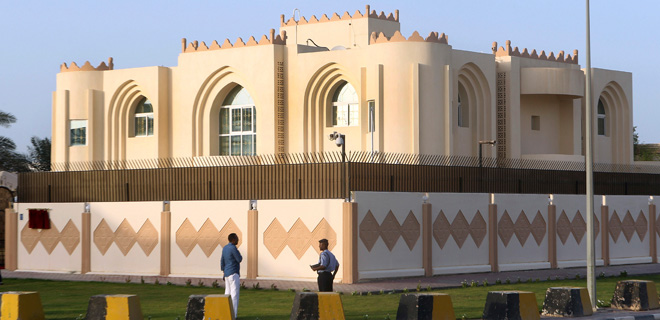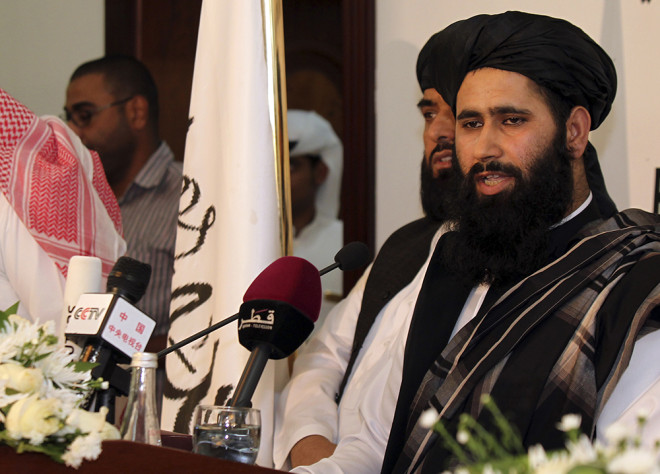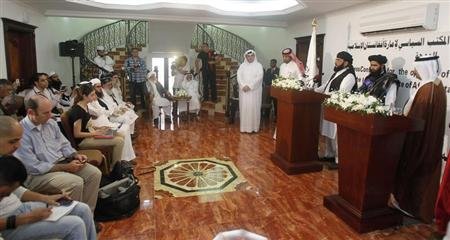In defense of their actions, the Taliban spokesman in Doha announced that, “the spat has frustrated and angered some within the [militant movement] who said the Taliban have been meeting with representatives of dozens of countries and holding secret one-on-one meetings with members of Karzai’s High Peace Council on several occasions, always under the banner of the Islamic Emirate of Afghanistan.” From this statement, it is evident that the Taliban is doing a suitable job of maintaining a consistent international posture and only using this recent media exposure to their added benefit.
While these talks may be necessary to subdue the insurgency in Afghanistan so that ISAF can present the Afghan government with a stable and relatively secure environment in 2014, it is not difficult to identify the dominant player in these political proceedings.
Not the Terrorists You’re Looking For
As US officials and diplomats scrambled to Doha in an attempt to save the anticipated peace talks after the Afghans announced they would not participate, the Taliban continued to dominate the diplomatic scene.
Understanding that the US has a timed withdrawal from Afghanistan and is rather inclined to pursue negotiations with the Taliban in order to quell the insurgency prior to its withdrawal, the Taliban furthered their political objectives and suggested that a prisoner exchange between the US and Taliban take place.
The Taliban claimed that a prisoner exchange (one that involves the possible release of Army Sgt. Bowe Bergdahl in exchange for several senior Taliban leaders currently held in Guantanamo) is at the top of their agenda in the peace talks moving forward. The US responded to this suggestion, acknowledging that the idea would have to be taken into consideration should the Taliban pursue it.
In order to accept the possibility of a prisoner swap with the Taliban, the current political conditions must again be taken into consideration. Note that the Islamic Emirate of Afghanistan, or Taliban – depending on whom you ask – is not a State Department-designated Foreign Terrorist Organization. Disregard that the Taliban works extensively with FTOs like the HQN, AQ, TTP, and many others to counter and destroy US efforts in Afghanistan. Ignore the fact that insurgent groups like the Taliban utilize terrorist tactics to enact unlawful violent acts against human life that are intended to intimidate or coerce a civilian population, influence the policy of a government, or affect the conduct of a government. So long as the Taliban confine their efforts within Afghan territory, their operations will likely not fall under the US definition of terrorist activity. Due to ambiguous language and definitions placed on US foreign policy, current political conditions allow the US foreign policy decision-makers to pursue a prisoner swap should they call for it.
Rather than focus on negotiating with the Taliban alone, some members of Congress have called for more widespread efforts across the Afghan political and tribal spectrum, identifying that, “As US military power recedes in the region, we must again count on the friendship of the Uzbeks, Tajiks, Hazaras and friendly Pashtuns to achieve our strategic goals and keep the Taliban from returning to power.”
However, as long as the Taliban remain insurgents, criminals, and militants that counter US withdrawal deadlines and objectives, not terrorists – conceding to a prisoner exchange could prove to be a positive venture for both interested parties. The peace talks move forward, the US gets their only captured soldier back, and the Taliban see a considerable increase in leadership return to Pakistan.
The Opinion
For better or worse, US foreign policy in Afghanistan is coming under heavy scrutiny for the poor manner in which last week’s Doha events developed. The Taliban opened an official office and maximized the political and publicity returns that came with it, the Afghan government withdrew from the anticipated peace talks citing poorly handled communication with US foreign policy officials, and the US struggled to react and contain all of the second and third-order effects therein.
Strategically, the US is forced to create a solution to a looming withdrawal by 2014, one in which the stability and security of Afghanistan is at stake. Fostering a strong relationship with the Afghan government now is more critical than ever when determining the success of Afghanistan post-US or ISAF support.
It is dangerous to allow the Taliban to gain the major victories of international attention and political legitimacy that they did in Doha, especially in the context of US attempts to nurture a strong and trusting relationship between the US and the Karzai administration. The big question facing US foreign policy decision-makers lies in the fate of the Karzai administration, and whether or not the Afghan government possesses the wherewithal to effectively run the country and prevent native insurgent groups like the Taliban from surging back into political power post-ISAF.
The thoughts in this op-ed are obviously my own and do not represent those of the United States government. Just meant to bring up some serious discussion regarding some of the short-term costs associated with our government’s foreign policy decisions. Thanks for listening.
~14Charlie












COMMENTS